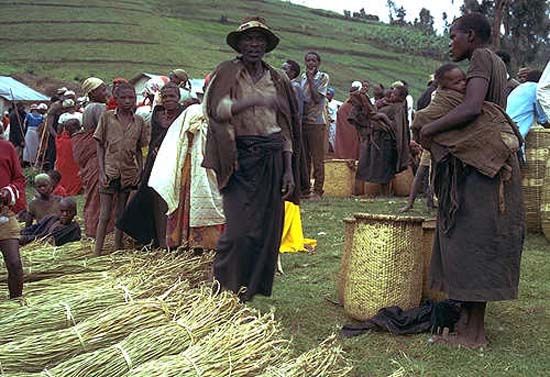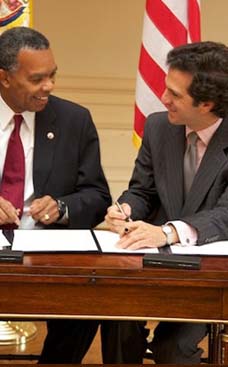
A fair-minded person might inquire: Why is all right for Germany to outlaw (Nazi) hate speech, but not so for the Rwandans? Why did journalists crusade for Victoire, but not subsequently report on her connections to aggressive splinter groups? Why hasn't anyone contrasted the activities of the three-dozen press organizations that thrive in Rwanda versus the two that were banned for six months? And, if working papers were rescinded in the USA when an international organization tried to take short cuts, Why would that not make the international news?
Kenya RPCV Michael Fairbanks writes: Nothing Good Comes Out of Africa
Nothing Good Comes Out of Africa
Michael Fairbanks
Co-Founder of The SEVEN Fund
Posted: May 3, 2010 08:17 AM
I am a teacher, author and philanthropist, and I was a racist. Racism doesn't have to mean you hate those who are different than yourself. It can mean the subtle, pernicious accumulation of unconscious prejudices against those who see the world differently.
I was raised in Scranton, Pennsylvania and attended Catholic and public schools all the way through college. My first notion of the poor in other countries was when the nuns, dressed imposingly in black tunics covered with pulverized chalk, prevailed upon us to put our milk money into an empty can of Crisco marked in crayon, "For Pagan Babies."
I joined the Peace Corps and went to Kenya when I was twenty-one years old. I lived in a mud hut, learned Swahili, built a village school and returned to the USA to do my graduate degree in African Politics at Columbia University. I remain in touch with my fellow teachers and students from the village to this day. Still.
The values and norms of the institutions in which we live and work wash over us. I went into the development industry with sound intentions, and worked extremely hard, but my results were meager. I worked in 35 nations at a very high level. I wrote books and lectured at the world's greatest universities. After a while, my successful script became stale, and my resume grew like a tall tree with leafy branches, though its core was hollowing with age. I had fallen under the spell of the development industry. I was prey to donor fashions, the whims of the Ivy League, Capitol Hill and Brussels, and the cynical detachment of over-educated, under-appreciated international journalists and aid bureaucrats. I believed that nothing good comes out of Africa.
Dusty, Poor Nations
Then, ten years ago, I went to work in Rwanda. Leaders of the World Bank introduced me to Paul Kagame who had been president for a few weeks. I had no reason to believe he was anyone special. I committed to work hard, but if I am being truthful, I had no reason to believe my advice would amount to anything more than it did in Bolivia in the early nineties, Uganda or Tatarstan in the late nineties, or any number of dusty, poor nations in between.
My first meeting with Kagame was forty hours long, spread over five consecutive days. My experience was that no head of government ever worked that hard, ever focused like that. Over the next few years, I was privileged to learn from Rwandan leaders and observe first-hand how they grew their nation. Rwanda's leaders, not just Kagame, but also its Prime Minister, cabinet and the remarkable women who serve in parliament, have given me hope and courage.
Rwanda is one of the few nations in the developing world that spends more on education than on the military. Though Kagame is from one ethnic group, his Prime Minister and 70 percent of his cabinet are from the other, and a world-leading 56 percent of parliament is now women. The country is secure and the World Bank's Doing Business report recognized Rwanda as the greatest reforming nation in the world last year.
The economy has grown at an average of 8 percent since 2001. More important, wages in export sectors increased by up to 30 percent each of the last nine years.
Rwanda has a good neighbor policy. It played a key role in reducing recent tensions between Kenyans, vastly improved its relations with the Congo (the two presidents routinely share information), and was the first country to send peacekeepers to Darfur. Working side by side there, many of the Rwandan soldiers are children of both the perpetrators and victims of the genocide. The international press and sentimental filmmakers overlook these stories.
They prefer to speculate that Rwandan prosperity means they must be stealing minerals from Congo, that clean streets and rule of law mean suppression, that Kagame will not step down from power when his next term is up. They have seen the world like this for some time. I see it in their eyes, still.
A Tad Deeper, Please
In my view, one of those self-branded CNN shows focusing on what Bill Maher has called "Disaster Porn," spent way too much time asking Paul Kagame about a minor opposition candidate in the upcoming elections. The journalist didn't acknowledge that Victoire Ingabire had just taken a Rwandan passport, and arrived in January with close aide Joseph Ntawangundi. When allegations arose of his complicity in genocide, Ingabire persuaded diplomats, journalists, and NGOs that he was not only innocent, but that the charges against her aide were politically motivated. There was international silence in March, when Ntawangundi confessed to using a pseudonym to reenter the country, to killing 8 people in the genocide, and to previously being sentenced to 17 years in prison.
Now, due to international and regional cooperation, there is evidence of wire transfers showing that Ingabire sent thousands of dollars to Congo to pay for arms and ammunition. There are phone logs, emails and co-conspirator confessions concerning her contacts and coordination with FDLR leaders, and attempts to create a violent splinter faction. Ingabire was indicted on April 21st and released on bail the following day.
Rwanda's genocide denial laws have been characterized as "unique, vague, and overbroad." Rwanda has also been accused of using these laws to stifle free speech and government opposition.
But over a dozen European nations have specific laws criminalizing genocide denial and related speech. In fact, all EU Member States are now legally obligated to criminalize genocide denial when it is carried out to incite violence. The Rwandans have proposed an international conference where prosecutors compare genocide denial and hate speech laws and develop best practices for their use.
The Government of Rwanda has been accused of cracking down on so-called opposition newspapers. On April 13, 2010, the government issued six-month suspensions to two Kinyarwanda-language newspapers, Umuvugizi and Umuseso, for publishing language such as the following:
"He who refuses a peaceful political revolution makes a bloody revolution necessary... The queue of those who want change in the governance of this country, (and not a peaceful one since all avenues for peaceful revolution can no longer work) is growing by the day. This is leading Rwanda into total darkness. (Umuseso)
Their words became reality on February 19th and March 4th of this year when terrorists threw grenades into public establishments in Kigali and killed innocent civilians. Rwanda knows a lot about freedom of speech and the role of the press. After all, in 1994, it was the press that ignited the genocide.
I called the Communications Director for the President and formally requested the list of news outlets that work in the country that have not been banned. The office provided the list to me in a few hours, and I was told that no one else has ever made that request. It is a varied list of world-class organizations functioning well.
Time, Newsweek, New York Times, Washington Post, Wall Street Journal, Reuters, AP, AFP, NPR, Los Angeles Times, Boston Globe, CBS, CNN, NBC, CBC, Guardian, Times of London, Independent, Financial Times, Daily Telegraph, Economist, Al Jazeera, NHK, East Africa TV, SABC, ETV, France 24, TV5, FR3, TF1, RFI, Canal+, Jeune Afrique, Der Spiegel, Arte TV, VPRO
Also, during the time of the genocide, there was one radio station, Radio Rwanda. Today Rwanda has thirteen independent radio stations.
There are other illustrations, some of which are funny: the Rwandan general who recently ran from the country and claimed he was a political refugee. A senior military official informed me that the general was actually sleeping with the wife of another general who was away on duty, and was about to be indicted under military law. The general ran away and convinced the international press that he was a heroic figure standing up to oppression and asked for asylum. I bet he needs it, too, from the irate husband.
Or the Human Rights Watch employee who claims that Rwanda is preventing her from working there: She was given a work permit within three days-- until it was found out her papers were fraudulently signed by her organization to expedite the process. Still, her office remains open.
A fair-minded person might inquire: Why is all right for Germany to outlaw (Nazi) hate speech, but not so for the Rwandans? Why did journalists crusade for Victoire, but not subsequently report on her connections to aggressive splinter groups? Why hasn't anyone contrasted the activities of the three-dozen press organizations that thrive in Rwanda versus the two that were banned for six months? And, if working papers were rescinded in the USA when an international organization tried to take short cuts, Why would that not make the international news?
I believed for too long that not a lot of good comes out of Africa. The Rwandans held up a mirror to my face. I could see that my way of doing things wasn't helping, and I began to add value when I became willing to be guided by their vision.
I still tend to parentalize the poor, though I no longer believe the American conceptualizations of democracy and human rights are superior to all other peoples, or that the world should progress at the rate I determine. But one good thing about having been a racist, I can spot others a mile away.
Michael Fairbanks has been an advisor to a number of heads-of-government in Africa, the Caribbean, Latin America and Asia, and author of Harvard's landmark book on Enterprise Solutions to Poverty, "Plowing the Sea", and more recently, "In The River They Swim."












